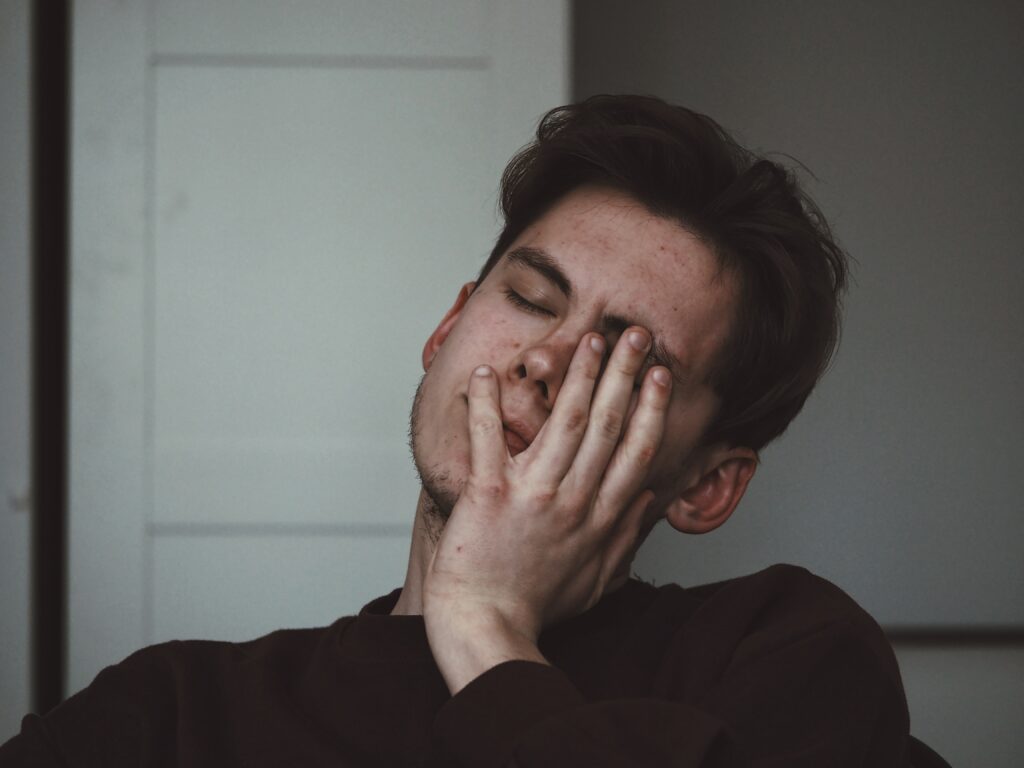Benzodiazepine (Benzo) Addiction
Dangers of Benzodiazepine Abuse & Misuse
The risk of benzodiazepine addiction (benzo addiction) is one of the primary reasons that this class of medications is only recommended for short-term use.
Benzodiazepines, commonly abbreviated to benzos, are prescription medications indicated to treat anxiety or panic disorders.
When you take benzos, the medication decreases activity in the brain and CNS (central nervous system). This triggers a calming effect as the properties of GABA are intensified. GABA is a naturally occurring brain chemical.
Today’s guide showcases how benzo addiction can develop rapidly, even when the medication is used as directed. You will also discover how to detox from benzos as safely and comfortably as possible and learn how to connect with benzodiazepine addiction treatment at Renaissance Recovery.
What are Benzodiazepines?

Benzos are sedatives and central nervous system depressants that are prescribed to treat various conditions and mental disorders, including:
-
Anxiety disorder
-
Panic disorder and panic attacks
-
Insomnia
-
Seizures
The DEA (U.S. Drug Enforcement Administration) classifies benzodiazepines as a Schedule IV controlled substance. Drugs under this schedule do not have a high potential for abuse and addiction when they are used short-term and as directed. The risk of abuse and addiction increases in line with the sustained use of benzodiazepines.
Benzos like Klonopin and Xanax bring about sedative effects similar to those triggered by opioids like oxycodone and hydrocodone, although benzos are associated with a lower risk of overdose than other drugs like opioids. That said they are still one of the most commonly prescribed medications and thus, one of the more commonly abused drugs.

Are Benzos Addictive?
With sustained use, tolerance to benzodiazepines forms quickly, meaning that you will require more of the substance or more frequent doses to deliver the initial effects. With the potency of benzos diminishing as tolerance continues to grow, many people perpetuate a cycle of abuse by increasing consumption.
This leads to an increased risk of physical benzodiazepine dependence. If you become physically dependent on benzos, you will experience aggravating benzodiazepine withdrawal syndrome if you moderate or discontinue your use of the prescription medication. Both tolerance and benzodiazepine withdrawal are diagnostic criteria for benzos addiction.
The long-term abuse of any type of benzo will prompt functional and structural changes to areas of the brain that govern reward. Over time, you will require the medication to function normally and to stave off benzodiazepine withdrawal.
How Addictive are Benzodiazepines?
The risk of benzodiazepine addiction increases the more of the medication that you take. Tolerance to benzos can form almost from the onset of therapy. Dependence can develop in two weeks, even when benzos are used in small doses exactly as prescribed.
The risk of addiction is greater for those who:
-
Take benzodiazepines long-term.
-
Take larger doses of benzos than directed.
-
Use benzodiazepines in combination with other substances – opioids or alcohol, for instance.
-
Have a history of addiction or drug abuse.
If you become addicted to benzos, you will benefit from a tapered reduction in dosage under medical supervision followed by inpatient or intensive outpatient treatment at a benzo rehab.
Button
Why are Benzodiazepines Addictive?
Benzos have a mechanism of action that enhances the activity of GABA, a neurotransmitter or chemical messenger that can calm the brain and minimize feelings of agitation and anxiety.
That said, benzo drug addiction can develop due to the way benzodiazepines cause an increased release of dopamine, a neurotransmitter that is associated with reward and pleasure. With sustained use of benzos, the brain may become dependent on the medication to deliver rewarding, pleasurable feelings, leading to the development of addiction (substance use disorder), an intense form of psychological dependence.
Beyond this, benzos can also cause physical dependence, whereby the body adapts to the continuous presence of the drug, ultimately requiring benzos to function effectively. If you develop physical dependence on benzos and you stop taking the medication, withdrawal symptoms like insomnia, anxiety, and seizures may present.
Also, benzodiazepines can also be misused and abused, and drug abuse can contribute to addiction. Some people may take higher doses than prescribed or use the drug recreationally, which can lead to addiction and other negative consequences.

Fight Back Against Benzodiazepine Addiction
Get evidence-based treatment to overcome benzo addiction at Renaissance Recovery. Call our team now to learn more about the process.
Most Addictive Benzodiazepines
All benzodiazepines have the potential to be addictive, but some are considered more addictive than others due to their potency, duration of action, and other factors. Here are some of the most addictive benzodiazepines:
Alprazolam (Xanax)
Xanax is a highly potent benzodiazepine that is commonly prescribed to treat anxiety disorders and panic disorders. Xanax has a rapid onset of action and a relatively short half-life, which can contribute to its addictive potential.
Clonazepam (Klonopin)
Klonopin is another strong benzo that is often used to treat seizure disorders, panic attacks, and anxiety disorders. Klonopin has a long half-life, which means that it can stay in the body for a longer period of time than some other benzodiazepines.
Lorazepam (Ativan)
Ativan is a benzodiazepine that is often used to treat anxiety, insomnia, and seizures. It has a relatively short half-life and can be highly effective at relieving anxiety, which can contribute to its addictive potential.
Diazepam (Valium)
Valium is a benzodiazepine that is commonly prescribed for anxiety, muscle spasms, and seizures. It has a long half-life, which means that it can stay in the body for a longer period of time than some other benzodiazepines.

Which Benzodiazepine has the Highest Abuse Potential?
Alprazolam (Xanax) is generally considered to have the highest abuse potential among benzodiazepines.
This is due to its rapid onset of action and high potency, which can produce a strong euphoric and muscle relaxation effect in some individuals. Xanax is commonly abused recreationally or as a way to enhance the effects of other drugs, such as opioids or alcohol. Additionally, Xanax is often involved in benzodiazepine-related overdose deaths.
Button
Signs of Benzo Addiction
Some telltale signs of benzodiazepine addiction can include:
-
Taking benzos for longer than the prescribed period.
-
Taking higher doses than recommended.
-
Continuing use despite negative consequences, such as damaged relationships, poor job performance, or legal problems,
-
Becoming more socially isolated and losing interest in previously enjoyable activities.
-
Reacting defensively or angrily when confronted about benzodiazepine use.
-
Experiencing withdrawal symptoms when attempting to quit or reduce use.
-
Seeking multiple prescriptions from different doctors or engaging in doctor shopping.
-
Combining benzos with other substances like opioids or alcohol, increasing the risk of adverse effects.
If you are concerned about your use of benzodiazepines and the potential for addiction, it’s important to consult with your prescribing physician for guidance and support. Don’t hesitate to seek help if you need it.
Common Benzo Addiction Symptoms
Professional help and support are essential in treating addiction, a condition that can be managed with the right intervention. Healthcare professionals rely on DSM-5-TR, the standard reference for diagnosing and classifying mental health disorders, including SUD (substance use disorder). SUD is a problematic pattern of substance use that can cause significant impairment or distress, as outlined in the DSM-5 criteria.
These are the Diagnostic and Statistical Manual (DSM) benzodiazepine addiction symptoms:
-
Taking the substance in larger amounts or for a more extended period than intended.
-
Unsuccessful attempts at moderating or discontinuing use.
-
Spending excessive amounts of time using the substance.
-
Experiencing cravings and urges to use the substance.
-
Problems with managing responsibilities at home, work, or school.
-
Continued use despite causing issues in relationships or social situations.
-
Giving up important activities due to substance use.
-
Using benzos despite physical or psychological problems.
-
Developing tolerance that requires higher doses to achieve the desired effect.
-
Withdrawal symptoms upon reducing or stopping use.
-
Using larger amounts of benzos over time that can lead to physical dependence and addiction.
The DSM-5 criteria for addiction are used to diagnose benzo addiction, and the number of criteria present determines the severity, with mild (2 to 3), moderate (4 to 5), and severe (6 or more) classifications available. With the appropriate professional intervention, addiction can be managed and overcome.
Addiction treatment typically involves a combination of detoxification, therapy, medication, and support groups. The goal of addiction treatment is not just to stop drug use, but also to help individuals build the skills and strategies they need to maintain sobriety and achieve a fulfilling life in recovery.
Dangers of Benzo Addiction
If you notice that you or a loved one is using prescribed benzodiazepines not as intended, you may be dealing with a case of benzodiazepine abuse and addiction. Like all forms of substance abuse and drug addiction, there are a number of dangers associated with benzodiazepine addiction.


What to Do if You're Addicted to Benzos
If you believe you are addicted to benzodiazepines, it’s vital to seek help from a healthcare professional as soon as possible. Here are some steps you can take:
Talk to your healthcare provider
The first step is to talk to your healthcare provider about your concerns. They can provide guidance on how to taper off the medication safely and effectively. They may also recommend other treatments to manage withdrawal symptoms and address underlying mental health issues.
Seek addiction treatment
In addition to working with your healthcare provider, it may be helpful to seek addiction treatment. This typically includes medication-assisted treatment, psychotherapy, counseling, and support groups to manage withdrawal symptoms and reduce the risk of relapse.
Build a support network
It’s critical for those in recovery to build a support network of friends, family, and other people who can provide emotional support and accountability throughout the recovery process.
Practice self-care
Taking care of yourself will streamline the recovery process. This could include eating a healthy diet, getting regular exercise, practicing relaxation techniques, and avoiding triggers that could lead to relapse.
Getting Help for Benzo Addiction at Renaissance Recovery
If you are addicted to benzos, you should consult your prescribing doctor before moderating or discontinuing use. Benzo withdrawal can be dangerous and potentially deadly if untreated. We can connect you with licensed medical detox centers throughout Southern California, enabling you to kickstart your recovery with a tapered reduction in benzodiazepine dosage.
Detox addresses the issue of physical dependence on benzos. Following detox, you can transition into one of the following benzodiazepine addiction treatment programs at our luxury Huntington Beach facility:
PHP (partial hospitalization program)
IOP (intensive outpatient program)
Dual diagnosis treatment program (for co-occurring disorders)
All drug abuse treatment programs at Renaissance offer individualized benzo addiction treatment that combines holistic and science-based therapies, such as:
Medication-assisted treatment
Psychotherapy
Group counseling
Individual counseling
Family therapy
Experiential adventure therapy
Aftercare
Take the first crucial step to beating benzodiazepine addiction by calling Renaissance Recovery today at 866.330.9449.

